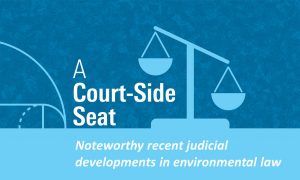The U.S. Department of the Interior (DOI) anticipates proposing a new rule that would revise its “Type A” Natural Resource Damage Assessment (NRDA) regulations under the Comprehensive Environmental Response, Compensation, and Liability Act (CERCLA) in Fall 2023. The proposed rule would modernize DOI’s rarely used simplified Type A procedures for assessing damages for natural resource injuries tailored at sites involving minor releases of hazardous substances, with a smaller scale and scope of natural resource injury occurring in either coastal and marine areas or Great Lakes environments (the “Type A Rule”). (See 88 Fed. Reg. 3373; see 43 C.F.R. Pt. 11 Subpt. D.) The Type A Rule was last updated in 1997.
Articles Posted in Environmental
Federal Regulatory Recap: A Summary of Recent Rulemaking Actions Taken or Proposed Affecting the Energy Industry
It is clear that these have been busy months for federal environmental regulators, especially those working at EPA, the federal departments and the Council on Environmental Quality. Even the Department of Agriculture has found itself coping with greenhouse gases (GHG) issues in its administration of the laws applicable to agriculture and the national forests. The ambitious scope of the current “all of government” approach may be discerned after learning how many disparate federal agencies are employed in implementing this policy. So many actions have been proposed or completed that some state officials are experiencing “comment fatigue” because they are being overwhelmed by the scope, size, and complexity of these federal initiatives. The Environmental Protection Agency is, of course, at the forefront of these actions and activities, as described below.
A Court-Side Seat: SCOTUS Rulings, the Fiscal Responsibility Act and the October 2023 Calendar
The Supreme Court issued 58 opinions in the October 2022 Term. Rulings in several cases will affect the practice of regulatory and administrative law either directly or indirectly, as is recounted below. Before the Court adjourned, it released its calendar of cases to be argued in October 2023, and of course, more cases will be scheduled after the Court returns.
Summarizing Changes to NEPA in the Fiscal Responsibility Act (P.L. 118-5)
The National Environmental Policy Act (NEPA) was signed into law on January 1, 1970, and it has rarely been amended or revised since then. NEPA is basically a procedural statute which requires Federal permitting authorities, before a major federal project is approved, to carefully consider the significant environmental consequences of the proposed federal action. NEPA has been employed to conduct a probing review of wide variety of federal projects and actions, and the President’s Council on Environmental Quality (CEQ) has promulgated a comprehensive set of rules and guidance documents that must be followed or consulted. (See 40 CFR Section 1500 et seq.) The first set of NEPA rules was issued in 1978, and very little was done to bring the rules up to date until 2020. The first phase of this review has been completed, and a second and final phase will soon be underway. The NEPA review process includes the use of “categorical exclusions,” environmental assessments and environmental impact statements to measure the environmental impact of a proposed project. Over time, the rules and their implementation and judicial interpretation have become ever more complex, and an enormous body of NEPA case law has resulted.
A Survey of New Texas Environmental and Regulatory Laws Enacted in the 88th Session (Updated)
This is a brief survey of many of the environmental and regulatory laws passed by the Texas Legislature and signed by the Governor in the 88th Regular Session of the Legislature, which ended in May 2023, although a special session has been called to address lingering matters. Altogether, more than 1,000 laws were enacted in this session, including a surprising number of water-related environmental bills.
PFAS and the Challenge of Cleaning Up “Forever”
 From a stream of legal challenges, to ever-expanding regulations on things like cosmetics and drinking water, PFAS are the “forever chemicals” keeping companies and consumers on high alert. While industries scramble to remove the synthetic compounds from products, scientists are researching new techniques for scrubbing PFAS from the environment. There is money to be had for those who can find a more streamlined method of purging the substances—the U.S. Army Corps of Engineers has an $800 million contract on the table for the handling, destruction and replacement of PFAS-laden fire-fighting foam—leaving technology companies racing to create solutions. The three main PFAS cleaning techniques currently relied upon can be very effective but are also costly and may leave questionable byproducts in their wake.
From a stream of legal challenges, to ever-expanding regulations on things like cosmetics and drinking water, PFAS are the “forever chemicals” keeping companies and consumers on high alert. While industries scramble to remove the synthetic compounds from products, scientists are researching new techniques for scrubbing PFAS from the environment. There is money to be had for those who can find a more streamlined method of purging the substances—the U.S. Army Corps of Engineers has an $800 million contract on the table for the handling, destruction and replacement of PFAS-laden fire-fighting foam—leaving technology companies racing to create solutions. The three main PFAS cleaning techniques currently relied upon can be very effective but are also costly and may leave questionable byproducts in their wake.
New Case Law Update: Mountain Valleys, Chevron Deference and a Long-Awaited Resolution on the Sacketts’ Small Lot
This is a brief roundup of recent federal court environmental and regulatory law decisions from the federal courts over the past few months, including the much anticipated ruling in Sackett, et ux., v, Environmental Protection Agency.
Real Estate & Construction News Roundup (05/23/23) – Distressed Prices, Carbon Removal and Climate Change
In this week’s roundup, we consider distressed property bonds and loans, cities that are sinking under their own skyscrapers, efforts to lower carbon emissions, the unexpected potential of dirty diapers as a building material, and so much more.
Social Cost of Carbon Gets the Greenlight
In “Fifth Circuit Permits the Use of the Social Cost of Carbon, for Now,” Anne Idsal Austin and David M. McCullough examine the court’s decision to allow the Biden administration to further develop the Social Cost of Carbon (SCC) but to leave open the possibility of future judicial scrutiny of its implementation.
New Executive Order: Revitalizing Our Nation’s Commitment to Environmental Justice for All
The White House has released the text of the President’s new Executive Order strengthening the Federal Government’s commitment to taking new actions to enhance and promote environmental justice. The Order was published in the Federal Register on April 26, 2023 at 88 FR 25251. President Clinton’s pioneering 1994 Executive Order remains effective, but the Federal Government must, as part of a whole-of-government approach to environmental justice, “build upon and strengthen its commitment to deliver environmental justice to all communities across America.”
 Gravel2Gavel Construction & Real Estate Law Blog
Gravel2Gavel Construction & Real Estate Law Blog



